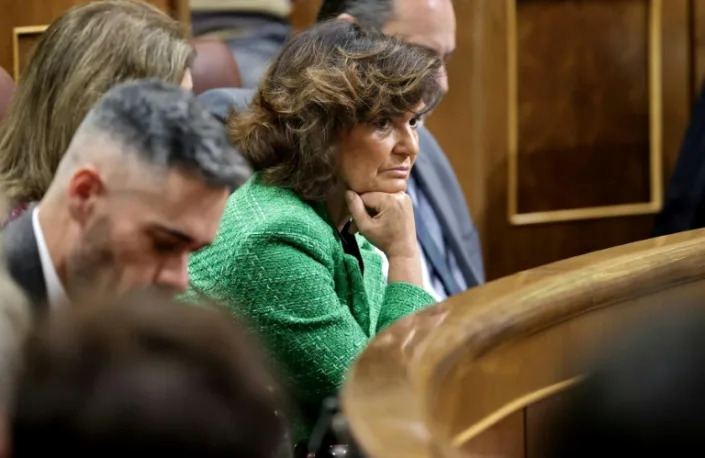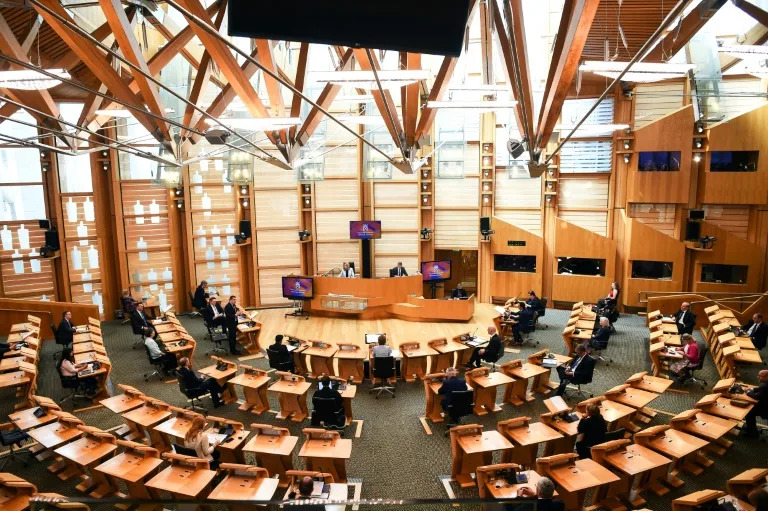Hazel WARD
Thu, December 22, 2022

Lawmakers on Thursday passed a transgender rights bill allowing anyone 16 and over to change gender on their ID card, putting Spain on track to becoming one of the few countries to allow the change with a simple declaration.
Approved by 188 votes with 150 against and seven abstentions, the bill now moves to the Senate where, if left unchanged as expected, it will become law in weeks.
The bill simplifies the procedure for changing gender on a person's national identity card, allowing them to request the change based on a simple statement.
It also bans conversion therapies, promotes non-discrimination against LGBTQ people in the workplace and seeks "to advance the inclusion" of transgender women in particular who tend to be disproportionately affected.
But the text has sparked a bitter dispute among activists in Spain's powerful feminist lobby and LGBTQ equality campaigners.

In Europe, Denmark was the first country to grant such a right in 2014.
The legislation is a flagship project of the equality ministry, which is held by Podemos, the radical left-wing junior partner in the Socialist-led coalition.
"That's how history is made," tweeted Equality Minister Irene Montero, thanking "the feminist majority" alongside a snapshot of the vote count and footage of LGBTQ campaigners applauding.
- 'Transphobia' -
A strong advocate of gender self-identification who has denounced opposition to the law as "transphobia", Montero has said the law would "depathologise trans lives and guarantee trans people's rights".
Until now, adults in Spain have been allowed to request the change with a medical report attesting to gender dysphoria and proof of hormonal treatment for two years, while minors needed judicial authorisation.

But the bill drops that requirement and lets anyone from the age 16 freely change their designated sex on their ID card. Even those as young as 12 can apply, but only under certain conditions.
After submitting the request, the applicant must confirm the demand three months later, then it will become valid.
Adopted by the cabinet in June 2021, the bill has sparked tensions between Podemos, the driving force behind the legislation, and the Socialists in Prime Minister Pedro Sanchez's government who have tried to modify it.
It has also divided the feminist movement between those supporting Montero and the powerful feminist lobby allied with the Socialists who are opposed to the text.
One of the most vocal opponents was Sanchez's former deputy Carmen Calvo, who abstained, telling local media she could never vote with the right-wing but could not bring herself to vote in favour of the bill.
- 'Neither voluntary or optional' -
"When gender is asserted over biological sex, it does not seem to me to be a step forward in a progressive direction; it seems to be a step backwards," she told El Mundo daily in September.
"The state has to provide answers for transgender people, but gender is neither voluntary nor optional."
Activists fear the law will be open to abuse and erode women's rights, allowing men who self-identify as women to compete in women's sport or request a transfer to women's prisons.

They have also raised alarm about minors having the right to self-determine gender. Under the bill, 12- and 13-year-olds need parental and judicial approval to do so, while 14- and 15-year-olds just need parental approval.
Although the Socialists pushed for an amendment that would have extended judicial authorisation up to the age of 15, it was rejected in what was widely seen as a victory for Montero and Podemos.
"The transgender law which will be approved today in parliament symbolises the Socialist party's biggest defeat by Podemos during this legislature," the conservative El Mundo newspaper said Thursday.
The centre-left El Pais said it was "one of the laws that had most strained the coalition government".
Tensions around the legislation prompted Socialist LGBTQ activist Carla Antonelli -- the first and only trans woman to serve as a lawmaker -- to resign from the party after decades of activism.
"We have seen part of the Socialist party and the feminist movement go from defending the rights of the trans minority to ruthlessly boycotting our very existence," she wrote in an op-ed published by El Pais on Thursday.
Scotland passes law easing gender change rules
Stuart GRAHAM
Thu, 22 December 2022

Lawmakers in Scotland passed a contentious law Thursday making it easier and faster for people to change their gender, despite a rare rebellion within the ruling Scottish National Party (SNP) and "concerns" from the UK government.
The legislation, which garnered 86 votes in favour but 39 against in Scotland's devolved parliament in Edinburgh, drops the requirement for a gender dysphoria medical diagnosis in order for someone to alter their gender.
"The motion is therefore agreed and the Gender Recognition Reform Scotland Bill is passed," presiding officer Alison Johnstone said to loud applause from the public gallery.
People aged 16 and 17 will also now be allowed to change their gender, despite efforts by some Scottish lawmakers to keep the age at 18.
The law reduces from two years to three months -- or six months for 16-17 year-olds -- the time needed for an applicant to live in their new gender before it is officially recognised.
An additional three-month reflection period is also required, during which time those who have initiated or are considering altering their gender can change their mind.
Opponents of the law fear it could be a danger to women and girls, particularly around the provision of single-sex spaces.
But the Scottish government insists the legislation will not impact the Equality Act, which allows for trans people to be excluded from single-sex spaces such as changing rooms and shelters.
Scotland's First Minister Nicola Sturgeon, who has faced one of the biggest internal rebellions of her eight-year tenure over the issue, said the previous system to change gender was "intrusive, traumatic and dehumanising".
- JK Rowling backed protests -
"I am a feminist. I will argue for women's rights. I will do everything I can to protect women's rights for as long as I live," Sturgeon said during a lengthy debate on the law.
"But I also think it's an important part of my responsibility to make life a little bit easier for stigmatised minorities in our country, to make their lives a bit better and to remove some of the trauma they live with on a day-to-day basis."
Rachael Hamilton, a Conservative lawmaker, said society as a whole was at risk from the law.
"While most of us around Scotland are good, decent, reasonable people, rapists are not, sex offenders are not," she said.
"It is ignorant to the extreme to believe they will not take advantage of loopholes that are ripe for exploitation."
The slow passage of the bill through the Scottish parliament has been marred by repeated protests, and seen Sturgeon pitted against Harry Potter author JK Rowling as well as some members of her own party.
Rowling, who has been accused of being transphobic and subjected to threats on social media since publishing a controversial essay on gender identity in 2020, backed protests in Edinburgh over the legislation.
Meanwhile SNP lawmaker Ash Regan, who was minister for community safety, resigned in October saying her conscience would "not allow" her vote for the law.
The UK government said on Thursday it shared "the concerns that many people have regarding certain aspects of this bill" and vowed to "look closely" at it.
London could try to block it coming into force if ministers believe the new Scottish law will conflict with UK-wide legislation.
srg/jj/fg
Stuart GRAHAM
Thu, 22 December 2022

Lawmakers in Scotland passed a contentious law Thursday making it easier and faster for people to change their gender, despite a rare rebellion within the ruling Scottish National Party (SNP) and "concerns" from the UK government.
The legislation, which garnered 86 votes in favour but 39 against in Scotland's devolved parliament in Edinburgh, drops the requirement for a gender dysphoria medical diagnosis in order for someone to alter their gender.
"The motion is therefore agreed and the Gender Recognition Reform Scotland Bill is passed," presiding officer Alison Johnstone said to loud applause from the public gallery.
People aged 16 and 17 will also now be allowed to change their gender, despite efforts by some Scottish lawmakers to keep the age at 18.
The law reduces from two years to three months -- or six months for 16-17 year-olds -- the time needed for an applicant to live in their new gender before it is officially recognised.
An additional three-month reflection period is also required, during which time those who have initiated or are considering altering their gender can change their mind.
Opponents of the law fear it could be a danger to women and girls, particularly around the provision of single-sex spaces.
But the Scottish government insists the legislation will not impact the Equality Act, which allows for trans people to be excluded from single-sex spaces such as changing rooms and shelters.
Scotland's First Minister Nicola Sturgeon, who has faced one of the biggest internal rebellions of her eight-year tenure over the issue, said the previous system to change gender was "intrusive, traumatic and dehumanising".
- JK Rowling backed protests -
"I am a feminist. I will argue for women's rights. I will do everything I can to protect women's rights for as long as I live," Sturgeon said during a lengthy debate on the law.
"But I also think it's an important part of my responsibility to make life a little bit easier for stigmatised minorities in our country, to make their lives a bit better and to remove some of the trauma they live with on a day-to-day basis."
Rachael Hamilton, a Conservative lawmaker, said society as a whole was at risk from the law.
"While most of us around Scotland are good, decent, reasonable people, rapists are not, sex offenders are not," she said.
"It is ignorant to the extreme to believe they will not take advantage of loopholes that are ripe for exploitation."
The slow passage of the bill through the Scottish parliament has been marred by repeated protests, and seen Sturgeon pitted against Harry Potter author JK Rowling as well as some members of her own party.
Rowling, who has been accused of being transphobic and subjected to threats on social media since publishing a controversial essay on gender identity in 2020, backed protests in Edinburgh over the legislation.
Meanwhile SNP lawmaker Ash Regan, who was minister for community safety, resigned in October saying her conscience would "not allow" her vote for the law.
The UK government said on Thursday it shared "the concerns that many people have regarding certain aspects of this bill" and vowed to "look closely" at it.
London could try to block it coming into force if ministers believe the new Scottish law will conflict with UK-wide legislation.
srg/jj/fg
No comments:
Post a Comment